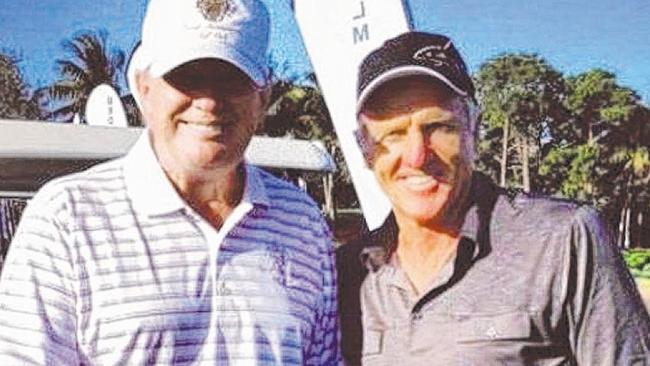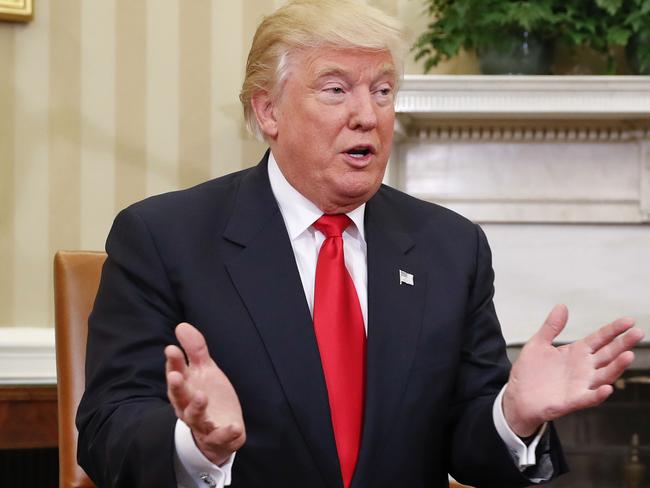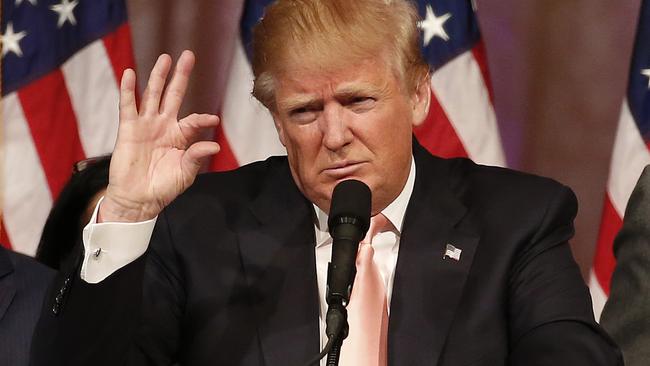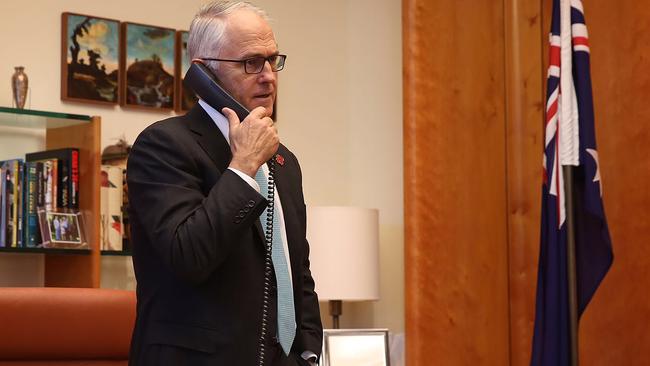The psychology behind the man: Why Australian politicians need to stop sucking up to Trump
THIS insight into Donald Trump’s psychology should chill Australia’s leaders to the bone — and make them rethink everything.

OPINION
IT SEEMS like every politician in Australia is keen to get on board the Trump Train.
When Donald Trump won unexpectedly earlier this month, our Prime Minister was so keen to be at the front of the queue of world leaders lining up to congratulate the property developer billionaire, he used Greg Norman as an intermediary to find out the best mobile number to call the President-elect on.
This week, Bill Shorten discovered a new-found sense of urgency about stopping skilled workers from coming into Australia, aping Trump’s scepticism towards the value of immigrants.
Meanwhile, Turnbull seems to have decided that demonising Muslims is the secret to unleashing Trump’s electoral appeal back home. During the week, Immigration Minister Peter Dutton attacked second and third generation Lebanese Australians, claiming that it was a mistake for their parents and grandparents to have been allowed to immigrate to Australia in the 1970s.
It was directly out of the Trump playbook.

But is this the right approach for Australian politicians to be taking with Trump? From a purely self-interested perspective, what approach should Malcolm Turnbull take to get the best deal for our nation when he’s dealing with someone who famously prides themselves on being a “brilliant negotiator”?
For some clues, it’s useful to look at Trump’s underlying psychological behaviours. There are lots of words that have been used to describe Trump - grandiose narcissist, sociopath, bully - but these are vague, catch-all phrases.
The key to understanding Donald Trump is to realise that he sees everything in life as a zero-sum negotiation between two competing sides. One side wins, one side loses. He applies this thinking to everything: his relationships with women, his business practice, even his family. It seems to be very important for him that his daughters are more beautiful than anyone else’s daughters — classic zero-sum thinking.
This is understandable — in the world of property development, commercial negotiations are generally zero-sum games. The more you pay your contractors, the less profit you get. This is because the trade is essentially in one direction. There is a buyer (the property developer) and the seller (the suppliers). It’s a very simple form of trade. Not many win-wins to be had.

Of course, the world would be a horrible place if Trump’s view of it were more generally true.
Trade between nations is an example where both sides can benefit. Australians understand this implicitly. We have more iron ore than we could possibly ever use in Australia, but by exporting that ore we can get money to buy stuff that we aren’t large enough to build on our own here, such as mobile phones or televisions. The rest of the world gets to use our iron, and we get to use their electronics. Both sides are better off. Classic win-win.
And Trump’s perspective about how the world works extends well beyond the economic. Trump has said that he hopes to broker peace in the Middle East. He told the New York Times on Wednesday, “I would love to be the one who made peace with Israel and the Palestinians, that would be such a great achievement.”
But peace negotiations ideally are about developing solutions that create a dividend for both sides (the dividend being both sides agreeing not to kill each other). Treated as a negotiation where one side wins and the other loses, there is no incentive for the losing side to agree to the terms.
Even something as simple as working out who should do the washing up can be a win-win negotiation. According to social scientists, marriages where housework is shared more evenly, and neither side “wins” or “loses” tend to be happier.
Somehow I don’t think Donald Trump does the washing up that much, and to be frank, I think that he would see it as a “loss” for him if he did.

When you see the world like Donald Trump does, in such a stark binary, there is a negotiation tactic that makes more sense than any other. It’s called the full court press, a term that derives from basketball.
It is the idea that after you’ve won a point, instead of allowing the other side to run half way up the court, you immediately start attacking them, the moment they’ve gained possession of the ball. It’s a horrible type of play to watch. It’s grinding, it’s relentless, and it feels unfair to the opposing team. It’s also chillingly effective.
In 2006, when Trump was negotiating to build a large golf course, he famously used every tactic in (his own) book to try to make landowners sell their land to him.
He defamed the land owners relentlessly in the national press, he cast aspersions on the value of their country, he mocked the terrible Scottish weather. It raised the ire of the Scottish people, and hatred of him that lingers even today, but he ended up getting his way and his golf course.
Whereas other would have worried about their reputation, Trump was unconcerned. He had won, and as far as he was concerned, that was all that mattered.
The point is, it’s awful and it feels unfair, but if you see life as a series of confrontational negotiations with only one winner at the end of the day, then it becomes virtuous to use every dirty trick in the book.
So if the full court press is such an effective tactic, why don’t all basketball teams use it all the time? The answer seems to be simple manners. Most professional basketballers love their sport. They don’t want to see the game ruined with such an awful tactic. A team would face public ire, and the hatred of fans if they came out and played such a grindingly awful to watch tactic from week to week.
And this is where Trump differs from most people. He doesn’t seem to feel shame in the same way that others do. In fact, I would argue, he feels shame only when he’s not “winning”.
Whereas most people would have been ashamed to be so horrible to the Scottish people, Trump felt no such shame. He would only have felt ashamed if he hadn’t won. Because then he would have been the thing he hates the most: a loser.

It doesn’t matter if Australia is a trusted and loyal ally, when it comes to negotiating the best outcome for his country, Donald Trump won’t hesitate to take strips off our politicians.
This makes it worrying that politicians on both sides of politics in Australia seem to be taking a more conciliatory approach. Turnbull’s key strategy seems to be a wait-and-see hopefulness that Trump will magically change his mind on the key policies that will affect Australia: trade and climate change.
Even as Donald Trump was busy announcing to the world that he would be abandoning the Trans-Pacific Partnership on Day One of his Presidency, Malcolm Turnbull was quoted as saying that “Free trade is a long game,” and that, “It may well be over time that the TPP is embraced by the United States ... perhaps in the same form it is today, perhaps in a different form”.

No matter how much wishful thinking the Turnbull government engages in, there is nothing in Trump’s background that suggests he’s going to suddenly adopt a multilateral trade agenda. His entire understanding of how the world works is anathema to such thinking. He’s said trade negotiations during his Presidency would be about putting “America first”, which is basically the opposite of free trade. The point of those multilateral trade deals like the TPP is that nobody “wins” or comes “first”, but instead everyone benefits.
In fact, in that very scenario, attempting to follow Trump’s lead on policy matters in order to curry favour is exactly the opposite of what is likely to work.
Australia’s politicians should be gearing up for a bruising full court press in negotiating its relationship, not sucking up to the ideas and whims of a President-elect who will only see such actions as a sign of weakness.
In fact, if Australia is going to make any gains internationally in the next four years, Australian politicians need to recognise that America will not be the ally we’ve come to expect them to be for the next four years, and pivot our attention to other countries in our region that still believe in win-win negotiations.
The Chaser’s Charles Firth was in the US on the election campaign trail. You can catch all his antics at www.chaser.news.



